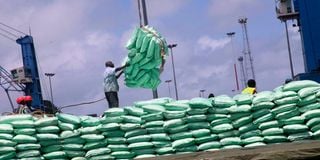Premium
Kebs sets tough rules on sugar imports

Imported sugar being offloaded onto a flatbed truck within the port of Mombasa.
The Kenya Bureau of Standards (Kebs) has set tough rules for sugar imports under the State’s duty-free import window that was gazetted on August 9, 2023, to help deal with a deficit in local production.
The Cabinet last month sanctioned the extension of duty-free imports to tame skyrocketing prices, which hit a record Sh250 a kilogramme on a biting shortage of the commodity locally.
And with the expected entry of large consignments of sugar, Kebs has set rules aimed at curbing abuse by rogue traders.
The Kebs said all imported sugar with Certificates of Conformity (CoCs) will undergo mandatory re-inspection and testing at the port of entry free of charge.
“The sampling will take place in the presence of the importer or appointed agent and will be subjected to tests to verify compliance with the relevant requirements of the standards,” said the agency in a notice.
According to the rules, all imported sugar from countries where Kebs has appointed inspection companies and are not accompanied by CoCs will be inspected upon arrival at a fee equivalent to five per cent of the approved customs values.
All sugar from countries where Kebs has contracted inspection agents will still be subjected to destination inspection upon payment of a fee equivalent to 0.6 per cent of the approved customs value and testing fee (where applicable).
The Agriculture and Food Authority suspended sugar milling in July to allow factories to address the sugarcane shortage in western Kenya blamed on the neglect of the sugar industry.
Commercial sugarcane production in Kenya is mainly in the western, Nyanza, Rift Valley and Coastal regions. Over 300,000 farmers supply sugarcane to the millers. Outgrowers provide more than 94 per cent of the cane, while nucleus estates owned by the various milling supply the difference.





